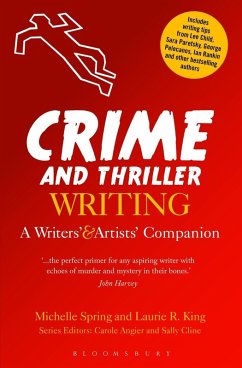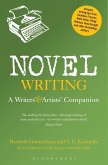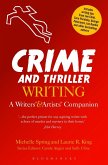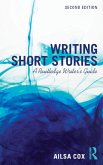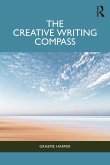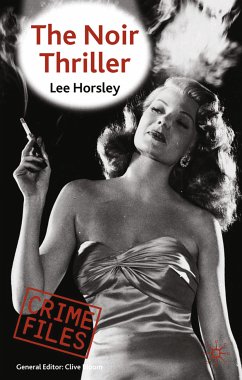Michelle Spring, Laurie R. King
Crime and Thriller Writing (eBook, PDF)
A Writers' & Artists' Companion
22,95 €
22,95 €
inkl. MwSt.
Sofort per Download lieferbar

11 °P sammeln
22,95 €
Als Download kaufen

22,95 €
inkl. MwSt.
Sofort per Download lieferbar

11 °P sammeln
Jetzt verschenken
Alle Infos zum eBook verschenken
22,95 €
inkl. MwSt.
Sofort per Download lieferbar
Alle Infos zum eBook verschenken

11 °P sammeln
Michelle Spring, Laurie R. King
Crime and Thriller Writing (eBook, PDF)
A Writers' & Artists' Companion
- Format: PDF
- Merkliste
- Auf die Merkliste
- Bewerten Bewerten
- Teilen
- Produkt teilen
- Produkterinnerung
- Produkterinnerung

Bitte loggen Sie sich zunächst in Ihr Kundenkonto ein oder registrieren Sie sich bei
bücher.de, um das eBook-Abo tolino select nutzen zu können.
Hier können Sie sich einloggen
Hier können Sie sich einloggen
Sie sind bereits eingeloggt. Klicken Sie auf 2. tolino select Abo, um fortzufahren.

Bitte loggen Sie sich zunächst in Ihr Kundenkonto ein oder registrieren Sie sich bei bücher.de, um das eBook-Abo tolino select nutzen zu können.
Crime and Thriller Writing: A Writers' & Artists' Companion is an essential guide to writing in these exciting genres.
PART 1 explores the nature and history of the genre and helpsyou get started with ideas, planning and research.
PART 2 includes tips by bestselling crime writers: Mark Billingham, S.J. Bolton, Alafair Burke, Lee Child, N. J. Cooper, Meg Gardiner, Tess Gerritsen, Sophie Hannah, Jim Kelly, Laura Lippman, Gayle Lynds, Alex McBride, Val McDermid, Dreda Say Mitchell, Sara Paretsky, Jill Paton Walsh, George Pelecanos, Ian Rankin, Peter Robinson, S. J. Rozan, Guy Saville, Yrsa…mehr
- Geräte: PC
- mit Kopierschutz
- eBook Hilfe
- Größe: 2.76MB
Andere Kunden interessierten sich auch für
![Novel Writing (eBook, PDF) Novel Writing (eBook, PDF)]() Romesh GunesekeraNovel Writing (eBook, PDF)22,95 €
Romesh GunesekeraNovel Writing (eBook, PDF)22,95 €![Writing Historical Fiction (eBook, PDF) Writing Historical Fiction (eBook, PDF)]() Celia BrayfieldWriting Historical Fiction (eBook, PDF)22,95 €
Celia BrayfieldWriting Historical Fiction (eBook, PDF)22,95 €![The Routledge Intermediate to Advanced Japanese Reader (eBook, PDF) The Routledge Intermediate to Advanced Japanese Reader (eBook, PDF)]() Noriko IwasakiThe Routledge Intermediate to Advanced Japanese Reader (eBook, PDF)55,95 €
Noriko IwasakiThe Routledge Intermediate to Advanced Japanese Reader (eBook, PDF)55,95 €![Crime and Thriller Writing (eBook, ePUB) Crime and Thriller Writing (eBook, ePUB)]() Michelle SpringCrime and Thriller Writing (eBook, ePUB)22,95 €
Michelle SpringCrime and Thriller Writing (eBook, ePUB)22,95 €![Writing Short Stories (eBook, PDF) Writing Short Stories (eBook, PDF)]() Ailsa CoxWriting Short Stories (eBook, PDF)23,95 €
Ailsa CoxWriting Short Stories (eBook, PDF)23,95 €![The Creative Writing Compass (eBook, PDF) The Creative Writing Compass (eBook, PDF)]() Graeme HarperThe Creative Writing Compass (eBook, PDF)38,95 €
Graeme HarperThe Creative Writing Compass (eBook, PDF)38,95 €![The Noir Thriller (eBook, PDF) The Noir Thriller (eBook, PDF)]() Lee HorsleyThe Noir Thriller (eBook, PDF)73,95 €
Lee HorsleyThe Noir Thriller (eBook, PDF)73,95 €-
-
-
Crime and Thriller Writing: A Writers' & Artists' Companion is an essential guide to writing in these exciting genres.
PART 1 explores the nature and history of the genre and helpsyou get started with ideas, planning and research.
PART 2 includes tips by bestselling crime writers: Mark Billingham, S.J. Bolton, Alafair Burke, Lee Child, N. J. Cooper, Meg Gardiner, Tess Gerritsen, Sophie Hannah, Jim Kelly, Laura Lippman, Gayle Lynds, Alex McBride, Val McDermid, Dreda Say Mitchell, Sara Paretsky, Jill Paton Walsh, George Pelecanos, Ian Rankin, Peter Robinson, S. J. Rozan, Guy Saville, Yrsa Sigurðardóttir, Dana Stabenow, Andrew Taylor, Charles Todd and Laura Wilson. PART 3 contains practical advice--from shaping plots and exploring your characters to the meaning of writer's block, the power of the rewrite, and how to find an agent when your novel is complete.
PART 1 explores the nature and history of the genre and helpsyou get started with ideas, planning and research.
PART 2 includes tips by bestselling crime writers: Mark Billingham, S.J. Bolton, Alafair Burke, Lee Child, N. J. Cooper, Meg Gardiner, Tess Gerritsen, Sophie Hannah, Jim Kelly, Laura Lippman, Gayle Lynds, Alex McBride, Val McDermid, Dreda Say Mitchell, Sara Paretsky, Jill Paton Walsh, George Pelecanos, Ian Rankin, Peter Robinson, S. J. Rozan, Guy Saville, Yrsa Sigurðardóttir, Dana Stabenow, Andrew Taylor, Charles Todd and Laura Wilson. PART 3 contains practical advice--from shaping plots and exploring your characters to the meaning of writer's block, the power of the rewrite, and how to find an agent when your novel is complete.
Produktdetails
- Produktdetails
- Verlag: Bloomsbury UK eBooks
- Seitenzahl: 304
- Erscheinungstermin: 15. August 2013
- Englisch
- ISBN-13: 9781472524577
- Artikelnr.: 48058606
- Verlag: Bloomsbury UK eBooks
- Seitenzahl: 304
- Erscheinungstermin: 15. August 2013
- Englisch
- ISBN-13: 9781472524577
- Artikelnr.: 48058606
- Herstellerkennzeichnung Die Herstellerinformationen sind derzeit nicht verfügbar.
Michelle Spring has published six crime novels including Every Breath You Take (short-listed as Best First Novel for both an Anthony and an Arthur Ellis Award), Nights in White Satin, In the Midnight Hour (winner of the Arthur Ellis Award for Best Novel) and The Night Lawyer. She mentors novelists, and teaches both creative writing and academic writing. She is currently Royal Literary Fellow at Magdalene College, Cambridge.
Michelle Spring, has published six crime novels including Every Breath You Take (short-listed as Best First Novel for both an Anthony and an Arthur Ellis Award), Nights in White Satin, In the Midnight Hour (winner of the Arthur Ellis Award for Best Novel) and The Night Lawyer. She mentors novelists, and teaches both creative writing and academic writing. She is currently Royal Literary Fellow at Magdalene College, Cambridge.
Michelle Spring, has published six crime novels including Every Breath You Take (short-listed as Best First Novel for both an Anthony and an Arthur Ellis Award), Nights in White Satin, In the Midnight Hour (winner of the Arthur Ellis Award for Best Novel) and The Night Lawyer. She mentors novelists, and teaches both creative writing and academic writing. She is currently Royal Literary Fellow at Magdalene College, Cambridge.
Preface
Foreword by P. D. James
Preface by Carole Angier and Sally Cline
Introduction by Michelle Spring and Laurie R. King
Notes on Format and Terminology
Part One: On a Life of Crime
Reflections I, Michelle Spring: Thoughts About Crime
'I Always Knew I Wanted to Be a Writer'
Reasons to Write a Crime Novel
The Shadow of Violence
Just When You Thought It Was Safe to Come out of the Water...
Psychopaths and Everyday Killers
The Grim Reaper
Reflections II, Laurie R. King: A Life of Crime (Fiction)
An Honorable Calling
Mysteries, Greater and Lesser
Making a Crime Writer
The Mystery of the Mystery
Still Just Writing Haiku?
Writing as an Active Verb
Ways of Writing
Michelle Spring: The Orderly School of Writing
Laurie R. King: The Organic Way
Coda
The World of Crime
The Roots of the Matter: a History of Crime Fiction
What is Crime?
The Spectrum, Gentle to Thriller
Getting Ready
Reading Like a Writer
Ideas
Write What You Really Know
Where Do You Get Your Ideas?
Harvesting Ideas
Testing Ideas
Getting Rid of Ideas
Early Decisions
Point of View
Setting
Period
Series or Standalone?
'Sub-plots', 'Themes', and 'Author's Voice'
Plotting: How (and When) to Do It
The Organic Approach
The Orderly Approach
Middle Ground: The Orderly Organics
Research
What You Need to Know in Order to Write
Research in Stages
A Sense of Place
Library Vs Internet
The Expert
Taking Control of Your Research
Part Two: Guest Authors
Mark Billingham
S. J. Bolton
Alafair Burke
Lee Child
N. J. Cooper
Meg Gardiner
Tess Gerritsen
Sophie Hannah
Jim Kelly
Laura Lippman
Gayle Lynds
Alex Mcbride
Val Mcdermid
Dreda Say Mitchell
Sara Paretsky
Jill Paton Walsh
George Pelecanos
Ian Rankin
Peter Robinson
S. J. Rozan
Guy Saville
Yrsa Sigurdardóttir
Dana Stabenow
Andrew Taylor
Charles Todd
Laura Wilson
Part 3: Getting Your Story Across
The Tools of Writing
Plots, Characters, and Story: Chicken or Egg?
Plot Vs. Story
Language
Description
Setting-place and Time
Atmosphere, or, in Defence of Weather
Divisions: Sentence, Scene, Chapter, Book
Preface and Prologue
Dialogue and Body Language
Humour
Titles
Characters
Characters in Crime Fiction
What Do the Characters Want?
Narrators and Protagonists
Heroes and Villains
Sidekicks and Supporting Actors
The Victim
Distinctive Elements of Crime Fiction
Coincidence and Fair Play
The Clue
The Red Herring
Conflict and Violence
Pace and Progression
Stay True to Your Niche?
When the Going Gets Tough
Writer's Block
Working with Others-courses, Writing Groups, and Mentors
The Story's Arc, or Acts
The Curtain Rises: Opening and Hook
Act One: The Beginning
The Setup
Action and Suspense
Backstory and the Series Novel
Act Two: The Middle
Heaping on the Challenges
Pace-peaks and Valleys
Act Three: The Endgame
Closing and Coda
When You're 'finished': The Rewrite
The Rewrite
Reading Aloud
How Many Drafts?
What Next?
When You're Really Finished
The Publishable Manuscript
E-publishing
The Agent
Contests
When to Start the Promotion Wagon Rolling?
Author's Web Site
Social Media
Outreach
The Writer's Public Face
Conferences and Classes
Taking Criticism
What Are You Aiming For?
Resources and Reading
A Writer's Reference Library
Research Tools: Maps, Guidebooks, Experts, the Internet
Novels to Study
Bibliography
Foreword by P. D. James
Preface by Carole Angier and Sally Cline
Introduction by Michelle Spring and Laurie R. King
Notes on Format and Terminology
Part One: On a Life of Crime
Reflections I, Michelle Spring: Thoughts About Crime
'I Always Knew I Wanted to Be a Writer'
Reasons to Write a Crime Novel
The Shadow of Violence
Just When You Thought It Was Safe to Come out of the Water...
Psychopaths and Everyday Killers
The Grim Reaper
Reflections II, Laurie R. King: A Life of Crime (Fiction)
An Honorable Calling
Mysteries, Greater and Lesser
Making a Crime Writer
The Mystery of the Mystery
Still Just Writing Haiku?
Writing as an Active Verb
Ways of Writing
Michelle Spring: The Orderly School of Writing
Laurie R. King: The Organic Way
Coda
The World of Crime
The Roots of the Matter: a History of Crime Fiction
What is Crime?
The Spectrum, Gentle to Thriller
Getting Ready
Reading Like a Writer
Ideas
Write What You Really Know
Where Do You Get Your Ideas?
Harvesting Ideas
Testing Ideas
Getting Rid of Ideas
Early Decisions
Point of View
Setting
Period
Series or Standalone?
'Sub-plots', 'Themes', and 'Author's Voice'
Plotting: How (and When) to Do It
The Organic Approach
The Orderly Approach
Middle Ground: The Orderly Organics
Research
What You Need to Know in Order to Write
Research in Stages
A Sense of Place
Library Vs Internet
The Expert
Taking Control of Your Research
Part Two: Guest Authors
Mark Billingham
S. J. Bolton
Alafair Burke
Lee Child
N. J. Cooper
Meg Gardiner
Tess Gerritsen
Sophie Hannah
Jim Kelly
Laura Lippman
Gayle Lynds
Alex Mcbride
Val Mcdermid
Dreda Say Mitchell
Sara Paretsky
Jill Paton Walsh
George Pelecanos
Ian Rankin
Peter Robinson
S. J. Rozan
Guy Saville
Yrsa Sigurdardóttir
Dana Stabenow
Andrew Taylor
Charles Todd
Laura Wilson
Part 3: Getting Your Story Across
The Tools of Writing
Plots, Characters, and Story: Chicken or Egg?
Plot Vs. Story
Language
Description
Setting-place and Time
Atmosphere, or, in Defence of Weather
Divisions: Sentence, Scene, Chapter, Book
Preface and Prologue
Dialogue and Body Language
Humour
Titles
Characters
Characters in Crime Fiction
What Do the Characters Want?
Narrators and Protagonists
Heroes and Villains
Sidekicks and Supporting Actors
The Victim
Distinctive Elements of Crime Fiction
Coincidence and Fair Play
The Clue
The Red Herring
Conflict and Violence
Pace and Progression
Stay True to Your Niche?
When the Going Gets Tough
Writer's Block
Working with Others-courses, Writing Groups, and Mentors
The Story's Arc, or Acts
The Curtain Rises: Opening and Hook
Act One: The Beginning
The Setup
Action and Suspense
Backstory and the Series Novel
Act Two: The Middle
Heaping on the Challenges
Pace-peaks and Valleys
Act Three: The Endgame
Closing and Coda
When You're 'finished': The Rewrite
The Rewrite
Reading Aloud
How Many Drafts?
What Next?
When You're Really Finished
The Publishable Manuscript
E-publishing
The Agent
Contests
When to Start the Promotion Wagon Rolling?
Author's Web Site
Social Media
Outreach
The Writer's Public Face
Conferences and Classes
Taking Criticism
What Are You Aiming For?
Resources and Reading
A Writer's Reference Library
Research Tools: Maps, Guidebooks, Experts, the Internet
Novels to Study
Bibliography
Preface
Foreword by P. D. James
Preface by Carole Angier and Sally Cline
Introduction by Michelle Spring and Laurie R. King
Notes on Format and Terminology
Part One: On a Life of Crime
Reflections I, Michelle Spring: Thoughts About Crime
'I Always Knew I Wanted to Be a Writer'
Reasons to Write a Crime Novel
The Shadow of Violence
Just When You Thought It Was Safe to Come out of the Water...
Psychopaths and Everyday Killers
The Grim Reaper
Reflections II, Laurie R. King: A Life of Crime (Fiction)
An Honorable Calling
Mysteries, Greater and Lesser
Making a Crime Writer
The Mystery of the Mystery
Still Just Writing Haiku?
Writing as an Active Verb
Ways of Writing
Michelle Spring: The Orderly School of Writing
Laurie R. King: The Organic Way
Coda
The World of Crime
The Roots of the Matter: a History of Crime Fiction
What is Crime?
The Spectrum, Gentle to Thriller
Getting Ready
Reading Like a Writer
Ideas
Write What You Really Know
Where Do You Get Your Ideas?
Harvesting Ideas
Testing Ideas
Getting Rid of Ideas
Early Decisions
Point of View
Setting
Period
Series or Standalone?
'Sub-plots', 'Themes', and 'Author's Voice'
Plotting: How (and When) to Do It
The Organic Approach
The Orderly Approach
Middle Ground: The Orderly Organics
Research
What You Need to Know in Order to Write
Research in Stages
A Sense of Place
Library Vs Internet
The Expert
Taking Control of Your Research
Part Two: Guest Authors
Mark Billingham
S. J. Bolton
Alafair Burke
Lee Child
N. J. Cooper
Meg Gardiner
Tess Gerritsen
Sophie Hannah
Jim Kelly
Laura Lippman
Gayle Lynds
Alex Mcbride
Val Mcdermid
Dreda Say Mitchell
Sara Paretsky
Jill Paton Walsh
George Pelecanos
Ian Rankin
Peter Robinson
S. J. Rozan
Guy Saville
Yrsa Sigurdardóttir
Dana Stabenow
Andrew Taylor
Charles Todd
Laura Wilson
Part 3: Getting Your Story Across
The Tools of Writing
Plots, Characters, and Story: Chicken or Egg?
Plot Vs. Story
Language
Description
Setting-place and Time
Atmosphere, or, in Defence of Weather
Divisions: Sentence, Scene, Chapter, Book
Preface and Prologue
Dialogue and Body Language
Humour
Titles
Characters
Characters in Crime Fiction
What Do the Characters Want?
Narrators and Protagonists
Heroes and Villains
Sidekicks and Supporting Actors
The Victim
Distinctive Elements of Crime Fiction
Coincidence and Fair Play
The Clue
The Red Herring
Conflict and Violence
Pace and Progression
Stay True to Your Niche?
When the Going Gets Tough
Writer's Block
Working with Others-courses, Writing Groups, and Mentors
The Story's Arc, or Acts
The Curtain Rises: Opening and Hook
Act One: The Beginning
The Setup
Action and Suspense
Backstory and the Series Novel
Act Two: The Middle
Heaping on the Challenges
Pace-peaks and Valleys
Act Three: The Endgame
Closing and Coda
When You're 'finished': The Rewrite
The Rewrite
Reading Aloud
How Many Drafts?
What Next?
When You're Really Finished
The Publishable Manuscript
E-publishing
The Agent
Contests
When to Start the Promotion Wagon Rolling?
Author's Web Site
Social Media
Outreach
The Writer's Public Face
Conferences and Classes
Taking Criticism
What Are You Aiming For?
Resources and Reading
A Writer's Reference Library
Research Tools: Maps, Guidebooks, Experts, the Internet
Novels to Study
Bibliography
Foreword by P. D. James
Preface by Carole Angier and Sally Cline
Introduction by Michelle Spring and Laurie R. King
Notes on Format and Terminology
Part One: On a Life of Crime
Reflections I, Michelle Spring: Thoughts About Crime
'I Always Knew I Wanted to Be a Writer'
Reasons to Write a Crime Novel
The Shadow of Violence
Just When You Thought It Was Safe to Come out of the Water...
Psychopaths and Everyday Killers
The Grim Reaper
Reflections II, Laurie R. King: A Life of Crime (Fiction)
An Honorable Calling
Mysteries, Greater and Lesser
Making a Crime Writer
The Mystery of the Mystery
Still Just Writing Haiku?
Writing as an Active Verb
Ways of Writing
Michelle Spring: The Orderly School of Writing
Laurie R. King: The Organic Way
Coda
The World of Crime
The Roots of the Matter: a History of Crime Fiction
What is Crime?
The Spectrum, Gentle to Thriller
Getting Ready
Reading Like a Writer
Ideas
Write What You Really Know
Where Do You Get Your Ideas?
Harvesting Ideas
Testing Ideas
Getting Rid of Ideas
Early Decisions
Point of View
Setting
Period
Series or Standalone?
'Sub-plots', 'Themes', and 'Author's Voice'
Plotting: How (and When) to Do It
The Organic Approach
The Orderly Approach
Middle Ground: The Orderly Organics
Research
What You Need to Know in Order to Write
Research in Stages
A Sense of Place
Library Vs Internet
The Expert
Taking Control of Your Research
Part Two: Guest Authors
Mark Billingham
S. J. Bolton
Alafair Burke
Lee Child
N. J. Cooper
Meg Gardiner
Tess Gerritsen
Sophie Hannah
Jim Kelly
Laura Lippman
Gayle Lynds
Alex Mcbride
Val Mcdermid
Dreda Say Mitchell
Sara Paretsky
Jill Paton Walsh
George Pelecanos
Ian Rankin
Peter Robinson
S. J. Rozan
Guy Saville
Yrsa Sigurdardóttir
Dana Stabenow
Andrew Taylor
Charles Todd
Laura Wilson
Part 3: Getting Your Story Across
The Tools of Writing
Plots, Characters, and Story: Chicken or Egg?
Plot Vs. Story
Language
Description
Setting-place and Time
Atmosphere, or, in Defence of Weather
Divisions: Sentence, Scene, Chapter, Book
Preface and Prologue
Dialogue and Body Language
Humour
Titles
Characters
Characters in Crime Fiction
What Do the Characters Want?
Narrators and Protagonists
Heroes and Villains
Sidekicks and Supporting Actors
The Victim
Distinctive Elements of Crime Fiction
Coincidence and Fair Play
The Clue
The Red Herring
Conflict and Violence
Pace and Progression
Stay True to Your Niche?
When the Going Gets Tough
Writer's Block
Working with Others-courses, Writing Groups, and Mentors
The Story's Arc, or Acts
The Curtain Rises: Opening and Hook
Act One: The Beginning
The Setup
Action and Suspense
Backstory and the Series Novel
Act Two: The Middle
Heaping on the Challenges
Pace-peaks and Valleys
Act Three: The Endgame
Closing and Coda
When You're 'finished': The Rewrite
The Rewrite
Reading Aloud
How Many Drafts?
What Next?
When You're Really Finished
The Publishable Manuscript
E-publishing
The Agent
Contests
When to Start the Promotion Wagon Rolling?
Author's Web Site
Social Media
Outreach
The Writer's Public Face
Conferences and Classes
Taking Criticism
What Are You Aiming For?
Resources and Reading
A Writer's Reference Library
Research Tools: Maps, Guidebooks, Experts, the Internet
Novels to Study
Bibliography
